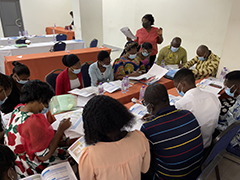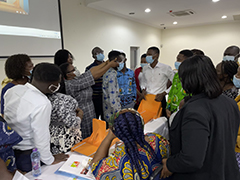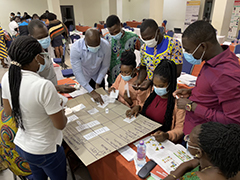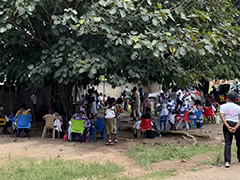- Home
- Technical Cooperation Projects
- Index of Countries
- Africa
- Ghana
- Project for Improving Continuum of Care for Mothers and Children through the introduction of Combined MCH Record Book
- Project News
- Training of trainers completed; total 939 facilitators were trained!
Project News
2021-10-11
Training of trainers completed; total 939 facilitators were trained!
A four-day training of trainers (ToT) took place from 14th to 17th September 2021 in Ashanti Region. The project organized two-batch concurrent training to train 70 facilitators: 15 from three control districts, 50 from five new regions, and 5 from the GHS HQ.
The project has been conducting health worker training, periodical monitoring and supervision (M&S), and the Social and Behavioral Change Communication (SBCC) activities in the 11 focus districts in Ashanti Region. In addition to the 11 districts, we assigned three control districts for the impact analysis in 2019. As we completed the data collection of the end-line survey in September 2021, we will start health worker training for the control districts. Thus, we trained district facilitators from the control districts. At the same time, we trained regional and district facilitators in five of the six new regions, as the new regions were not existing when we conducted TOT. The project already held an orientation and training for Oti region, one of the new regions, the remaining five new regions were the targets for this TOT. Additionally, some of the newly joined officers in the GHS HQ attended the TOT to be national facilitators.
With the completion of this training, the project has trained a total of 939 facilitators in all 16 regions in Ghana.
Training
The Project has conducted TOT since 2018 and has revised the curriculum and training materials whenever necessary. The training includes a variety of activities for the participants to acquire knowledge and skills effectively. At the same time, we have incorporated the latest information and GHS guidelines on maternal and child health and nutrition into the training curriculum.
Training went smoothly and fruitful. All the facilitators were competent in training and facilitation skills, and they used updated training materials effectively. Participants were also capable of asking practical questions as most of them had experiences of using MCH RB in past years. They asked about printing and distribution of the MCH RB, how to share knowledge and skills among health workers who did not attend the training or who were new to the service. Senior managers of GHS, Dr. Kofi Issah, Director of Family Health Division, Dr. Chris Fofie, Head of Safe Motherhood, and Ms. Esi Amoaful, Director of Nutrition, also joined this training, responded to questions from the participants, and explained how to deal with those issues. It was a valuable opportunity where representatives from the national, regional, and district levels discussed the sustainability issues of the MCH RB program beyond the training curriculum.
In the practical session held on the third and fourth days, the participants practiced the recording of MCH RB, weight and length/height measurement, and nutrition counseling. The facilitators closely observed the participants and gave prompt advice, and the participants were able to resolve any unclear points and deepen their understanding through the practice. Specifically, the participants carefully checked the recording process of the nutrition counseling table as many health workers face difficulties filling this table in practice.
In addition, the lecturers explained the monitoring checklist form to the participants as the participants will be responsible for Monitoring and Supervision (M&S). They stressed the points with which health workers may face difficulties.
 Recording practice
Recording practice
 Measurement practice
Measurement practice
 Group work to learn complementary feeding
Group work to learn complementary feeding
 Field practice; Child Welfare Clinic
Field practice; Child Welfare Clinic
Way forwards
We will start health worker training in the control districts of Ashanti region in October 2021. We will cover more than 300 health workers there. We expect that the facilitators of the new regions will conduct training or orientation to other health workers with their budget. As the national rollout strategies, we decided to train facilitators in all regions and districts and to provide the User Guide and training materials while we will not cover health worker training in all regions and districts.
The project completed the final TOT successfully. We observed all national and regional facilitators conducting the training with improved skills and confidence. They used training materials and training methods effectively. It was so much joy and happiness to see our counterpart take good care of capacity development which may be a source for the technical capacity on MCH RB in Ghana.
- About JICA
- News & Features
- Countries & Regions
- Our Work
- Thematic Issues
- Types of Assistance
- Partnerships with Other Development Partners
- Climate Change / Environmental and Social Considerations
- Evaluations
- Compliance and Anti-corruption
- Science and Technology Cooperation on Global Issues
- Research
- JICA Development Studies Program / JICA Chair
- Support for the Acceptance of Foreign HRs / Multicultural and Inclusive Community
- Publications
- Investor Relations
